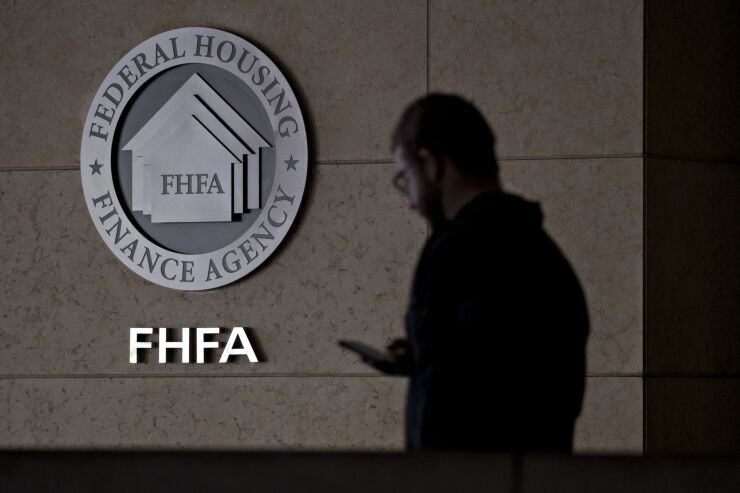WASHINGTON — As the courts increasingly focus on leadership structures at independent agencies, the Consumer Financial Protection Bureau and Federal Housing Finance Agency are often mentioned in the same breath.
But with the Supreme Court agreeing to
At issue are statutory provisions protecting agency directors not subject to board oversight from being removed by the president at will.
Both the FHFA and CFPB have such structures, which critics say are unconstitutional, but some experts say the courts may address the issue at the two agencies separately.
“There's enough of a difference between the statutes [for the two agencies] and in how the statutes deal with the scenario," said Richard Gottlieb, a partner at Manatt, Phelps & Phillips. “There's enough there for it not to be an automatic thing at all.”

To insulate both agencies from political pressures, so-called for-cause provisions in the laws creating the CFPB and FHFA require presidents to find cause before removing a director at either agency before their term ends.
That is the premise of the CFPB-specific case
“If the Supreme Court holds that the structure is unconstitutional and addresses the legality of past acts, then most lawyers would be looking to apply the lessons of that case to FHFA,” said Jeffrey Naimon, a partner at Buckley LLP.
Just as the CFPB-specific case has progressed, shareholders of Fannie Mae and Freddie Mac are asking the Supreme Court to weigh in on a lawsuit that argues the FHFA's leadership structure violates the separation of powers.
Observers said it is very unlikely that the Supreme Court would address the FHFA in their decision on the CFPB.
“A ruling by the Supreme Court in Seila Law on the constitutionality of the CFPB’s structure would have no direct impact on the FHFA,” said Alan Kaplinsky, the co-practice leader at Ballard Spahr's consumer financial services group.
But Kaplinsky noted that the Supreme Court could still decide to take up the Fannie and Freddie case, known as Collins v. Mnuchin, after it rules on the CFPB.
In a meeting with reporters last week, FHFA Director Mark Calabria emphasized that although the CFPB and FHFA might appear to be similar on the surface, there are significant differences between the agencies.
“My view has been that the CFPB is a different agency. I'll remind folks that the removal language actually is different. It's not the same as ours,” he said. “So my view is the CFPB can continue to weigh in on theirs and we're going to continue to weigh in on ours.”
Gottlieb pointed to two differences between the statutes that created the two agencies. (The FHFA was created by the 2008 Housing and Economy Recovery Act and the CFPB by the 2010 Dodd-Frank Act.)
One is Dodd-Frank gives the Financial Stability Oversight Council technical veto authority over CFPB policies, while HERA gives the Federal Housing Finance Oversight Board mere “advisory” authority over the FHFA.
The other difference is in the specific wording of the two for-cause provisions. In Dodd-Frank, the CFPB director may be removed solely for “inefficiency, neglect of duty, or malfeasance in office.” In HERA, an FHFA director can be removed just "for cause."
"The second standard is undefined and much looser," Gottlieb said. "So a court could easily conclude that the president’s removal rights are greater under HERA."
Critics of the single-director leadership structure atop both agencies have argued that if the Supreme Court were to rule the structure unconstitutional, it
In addition to throwing out the FHFA's leadership structure, the Fannie and Freddie shareholders argue the courts should also invalidate an Obama-era provision that required the government-sponsored enterprises to sweep nearly all of their profits to the Treasury Department.
“If there were a broader determination that for some reason, the CFPB's actions were void from commencement … that would have draconian results on everything,” Gottlieb said. “And the same thing would apply to everything that the FHFA has done, which is so extraordinarily broad, that the idea that the court would reach this result is just beyond absurd.”
Most experts agree that the Supreme Court is more likely to sever the for-cause provision for the CFPB, which would allow a president to fire the director of the agency at will rather than invalidate the entire agency and its policies.
“I don’t think it’s a foregone conclusion that the court will rule that the for-cause provision is unconstitutional,” Naimon said. “But if that's the direction they go, it's critical that they complete the circle and clarify the legality or lack of legality of past actions.”
Others are concerned that even removing the for-cause provisions would compromise the integrity of both the CFPB and the FHFA.
Both agencies are "supposed to be above politics,” said Stephen Ornstein, a partner at Alston & Bird. “I think when you look at Fannie and Freddie, I think one of the quibbles prior to the financial crisis is you had political appointees who made large sums of money and they felt that it compromised the independence of it.”
The current five-year terms of the directors of the CFPB and FHFA are intended to reduce the impact of political influence because theoretically their terms would cut across administrations, Gottlieb said.
“The removal of the provision even greater politicizes a position that has historically not been a political type of position," he said. "In other words, it's not a place where politics gets done.”





